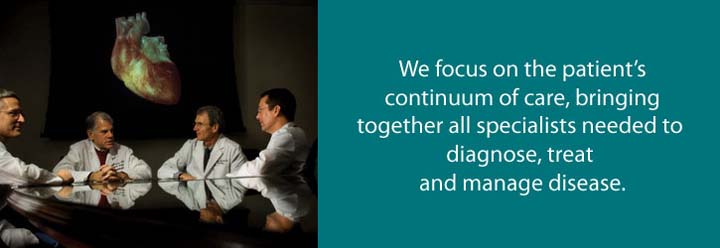A clinical trial under way at the East Carolina Heart Institute is testing the benefit of a new medical device designed to help high-risk people suffering from leaky heart valves.
Dr. W. Randolph Chitwood Jr., director of the Heart Institute and professor of cardiovascular surgery at the Brody School of Medicine at East Carolina University, secured the clinical trial for the MitraClip System for the treatment of mitral valve regurgitation (MR). A serious heart condition, MR can lead to arrhythmias and congestive heart failure if left untreated.
Dr. Curtis Anderson, a cardiothoracic surgeon and assistant professor of cardiovascular sciences, and Dr. Ramesh Daggubati, a cardiologist and clinical professor at Brody, collaborated to perform mitral valve repairs on two patients at Pitt County Memorial Hospital without making the traditional incision in the center of the chest to access the heart. Chitwood joined Drs. Rajasekhar Nekkanti and John Cahill, ECU cardiologists, to assist in the procedure.
In each case, the multidisciplinary team of cardiologists and surgeons placed a thin catheter in the patient’s groin vessel, guided a tiny clip through the heart’s septum and placed the clip between the leaflets of the valve to stop the leak.
“With mitral insufficiency, we normally use the heart/lung machine to either repair or replace the valve,†Chitwood said. “This new procedure is catheter-based, and can be used in high-risk patients who wouldn’t do well on the heart/lung machine. These patients have severe symptoms stemming from the leaky valve and can’t be operated on safely any other way.â€
Chitwood said this new procedure “gives the East Carolina Heart Institute an entirely new set of tools for mitral valve repairs in high-risk patients. It is the least invasive way that we can fix a valve. Centers selected to perform these procedures have demonstrated expertise in applying new medical technology under FDA (Food and Drug Administration) guidelines.â€
With the clip, patients leave the hospital the next day and within two or three days return to normal activities – or, in many cases, better-than-normal activities.
“Most of the patients are very sick,†said Daggubati, a clinical associate professor of cardiovascular sciences. “Medical management is the only option for them because surgeons consider the risk too high and the patients inoperable.â€
Anderson said patient selection is the key to a successful outcome.
“I think a lot of patients with heart failure will be attractive candidates for this device,†he said, adding that collaboration among physicians is vital. “We want patients to have the confidence of knowing that cardiologists and cardiac surgeons are working side by side to give them the best possible outcomes.â€
The mitral valve is a one-way valve that connects the left atrium to the left ventricle of the heart. With mitral valve regurgitation, the valve does not seal completely, and blood leaks back into the left atrium. This reversed flow can cause heart and lung damage, as well as death. Symptoms may include an audible heart murmur, shortness of breath and heart palpitations.
About the East Carolina Heart Institute
The East Carolina Heart Institute is a unique partnership that includes University Health Systems Pitt County Memorial Hospital and East Carolina University, along with cardiovascular experts in private practice, academic medicine and research. The East Carolina Heart Institute is the first in North Carolina devoted exclusively to education, research, treatment and prevention of cardiovascular diseases.
Via EPR Network
More Healthcare press releases



